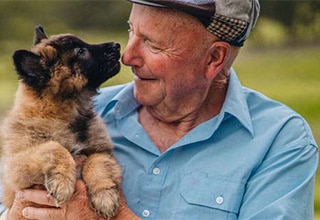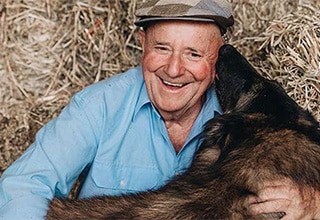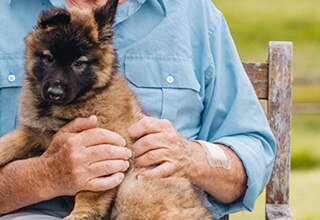- text
-
Dr Harry Cooper (AR No.1000933) is an Authorised Representative of PetSure (Australia) Pty Ltd (AFSL 420183). Any advice provided by Dr Harry Cooper in relation to Everyday Pet Insurance is general only and does not take into account your individual objectives, financial situation or needs.
Dr Harry: What to consider before getting a new puppy.
There is nothing more exciting than bringing a new puppy into the household, particularly if you are doing it for the first time. Before you rush out the door and buy the first four-legged bundle of canine mischief, there are lots of things to consider.
Research you should do before buying a new puppy.
Please do some research! I have lamented over so many families who have simply bought the wrong dog, and regardless of all the effort they have made, things just haven’t worked out. It doesn’t matter if you’re thinking about a pure breed or one of the many ‘designer dogs’ that are on the market, take a good look at what the parents were designed to do. Were they working dogs like Kelpies or Border Collies, scent hounds like Bassets and Beagles, or perhaps Poodles or Labradors which were bred to retrieve game?
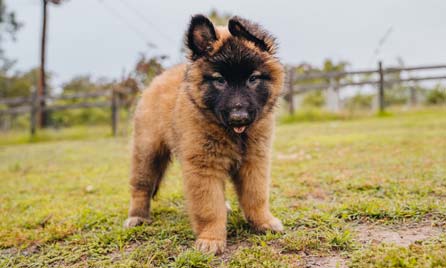
Up to 75% of the puppy’s behaviour will be inherited from the parents, both in their natural attitudes and also their temperaments. You should ask yourself:
Do you have the time to give working dogs the exercise they need daily?
Can you provide enough mental stimulation for a scent hound? Think about that one.
Are you close enough to water to allow retrieving breeds the enjoyment they love?
You may not always have the time once we return to ‘normal’. Your dog needs you, as much as you need them.
Consider your lifestyle.
But hang on, maybe we are putting the cart before the horse, no we are not going to discuss horses, just using a turn of phrase. We should be perhaps looking at the family circumstances:
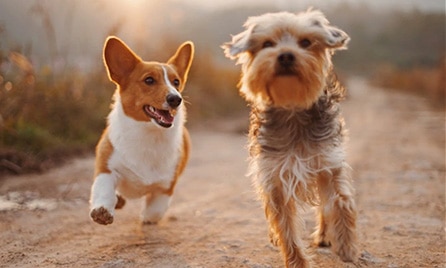
Are you a family with kids, a young couple, or perhaps a single someone in their later years?
What is your house and yard like? How much room is there for a dog to exercise outside?
Do you own your house or rent? In which case, you may need to consult your landlord to see if they allow pets.
Will the dog stay inside all the time, outside all the time, or a mixture of both? Do you need to install a doggy door so they can move in and out?
The answer to these questions will help you decide which breed will suit your circumstances.
Finding the right dog breed.
Dog breeds have changed so much in the over 50 years that I have been in veterinary practice. All those years ago we saw mainly larger dog breeds, today just the reverse is true. Something like three quarters of our pet dogs weigh less than 15kg. There are fewer pure breeds and so many cross breeds, many of which have several traits to commend them. We haven’t talked much about these little cuties like the Labradoodle, the Cavoodle, the Maltese/Shihtsu etc. They don’t need the room of the larger dog breeds, and are happy to live entirely within the house (except for toilet duties of course). They don’t eat as much, which saves money on the food bill, and obviously there’s less to clean up as well.
There is one big BUT, though. Most smaller dog breeds that are long-coated will need a regular trip to the doggy hairdresser, which can add to the cost, unless you learn to do it yourself. From a vet’s point of view, they tend to have more dental problems too. Crowded teeth are common in smaller dogs. Some can be nuisance barkers, but their love of life and their owners more than makes up for this. There is one big plus, little dog breeds tend to live much longer than large dog breeds. Whatever you choose, your dog will belong to the whole family, so what you purchase or adopt needs to be very much a family decision.
I’ve witnessed plenty of situations where a particular breed has been chosen by one of the parents, that has proved totally unsuitable for children: simply because they are small and the dog, as it grows, knocks them over, often causing fear on the part of the child. While I’m on this topic too, I have pretty strong feelings about kids and dogs. No child under the age of six has either the strength or voice control to handle a dog, and must therefore always be under parental supervision. Our television screens and social media are full of stories about unfortunate incidents with kids and dogs, but it’s a topic for another column, where we can look at bringing a new baby into a family where there is already a dog.
Making sure you’re prepared for a new puppy.
Like a good boy scout, you need to ‘Be Prepared’. This means that everything needs to be ready when your little hairy bundle arrives. Make sure the fences and the gates are escape proof. Put everything of value out of reach. Decide of course on a name, but make sure it doesn’t rhyme with command words like ‘Heel’ and ‘Sit’. You will need food and water bowls and of course somewhere for your new puppy to sleep. If you’re opting for a kennel, then make sure it is near to the back door or under your bedroom window, so the pup feels it’s in close contact with you. Crate training is also a great idea.
Check with the seller about diet. Try not to make any sudden changes which will almost always lead to diarrhoea, instead start by replacing one third of the original diet with one third of your chosen food. Gradually increase the content of your food choice over two weeks.
I wouldn’t be a vet if I didn’t talk about microchips, vaccinations, heartworms, worming, flea control (and ticks in certain areas). There is a wealth of information on the net once again, but make sure you read the articles that are written by vets. Locate and patronise a Veterinary Clinic in your area, with emergency services. Please follow their advice. After all flea and tick control as I have to keep advising people only works when you use it!
Training a new puppy.
Now we come to my hobby, house training. It is just so important. It starts with you, at home, and that’s toilet training, once again a topic for another day. You can try the ‘sit’ and ‘stay’, but my advice is to use a puppy preschool. Please ensure that the person running it is trained themselves! Too many mistakes can happen in early canine childhood if these classes are not properly supervised. Graduate from that to basic obedience, and then if you feel like going further, there are many dog sports, even for the smaller breeds, like flyball and agility. They are a great social activity as well.
A final thought. Dogs are indeed man’s best friend. I have never been without a dog. Pomeranian, Bulldog, Doberman, Greyhound, Italian Greyhound, Whippet, Cavalier King Charles, Maltese/ Shihtzu, Border Collie and Belgian Shepherd. I have loved them all, and that love has been returned 100 fold. I once wrote that my big regret in life would be not living long enough to have, for a least a time, all the other breeds that I love.
More to come on: What to look for when you go to buy, including a paragraph or two on adoption of a more mature dog. A bit on cats as well!
Why pick Everyday Pet Insurance?
Related articles.
- text
-
* Limits, waiting periods, exclusions and excesses may apply.
- text
-
# Policy Terms and Conditions, exclusions and limits apply. Benefit limit amounts vary by level of cover.
- text
-
‡ Cover is available for the life of your pet provided you renew your policy each year without any break, lapse or change in the level of Cover. This means once your pet is insured with us and as long as we continue to offer the product, you will be able to renew your policy for that pet for life and your cover level will not be reduced as your pet ages provided you continuously maintain the cover. Cover is subject to the terms and conditions of your renewing policy. See details in your PDS.
- text
-
= The gap is defined as the difference between the vet's invoice and the claim benefit under your policy. Policy terms and conditions apply. GapOnly® is only available at participating Vets. Please visit GapOnly® to search for GapOnly® enabled vets. GapOnly® is a trademark owned by PetSure (Australia) Pty Ltd (PetSure) (ABN 95 075 949 923, AFSL 420183).
- text
-
Everyday Pet Insurance policies entered into for the first time prior to 17 July 2023 and subsequent renewals of those policies are issued by The Hollard Insurance Company Pty Ltd ABN 78 090 584 473, AFSL 241436 (Hollard), arranged and administered by PetSure (Australia) Pty Ltd ABN 95 075 949 923, AFSL 420183 (PetSure) and promoted and distributed by Hollard’s Authorised Representative (AR) Woolworths Group Limited ABN 88 000 014 675, AR 245476 (Woolworths). Everyday Pet Insurance policies entered into for the first time on or after 17 July 2023 and subsequent renewals of those policies are issued by PetSure and promoted and distributed by PetSure’s AR, Woolworths. Any advice provided is general only and does not take into account your individual objectives, financial situation or needs. Please consider the Product Disclosure Statement (PDS) to ensure this product meets your needs before purchasing, or choosing to continue with the product. PDS and Target Market Determination available at insurance.everyday.com.au/pet-insurance.
